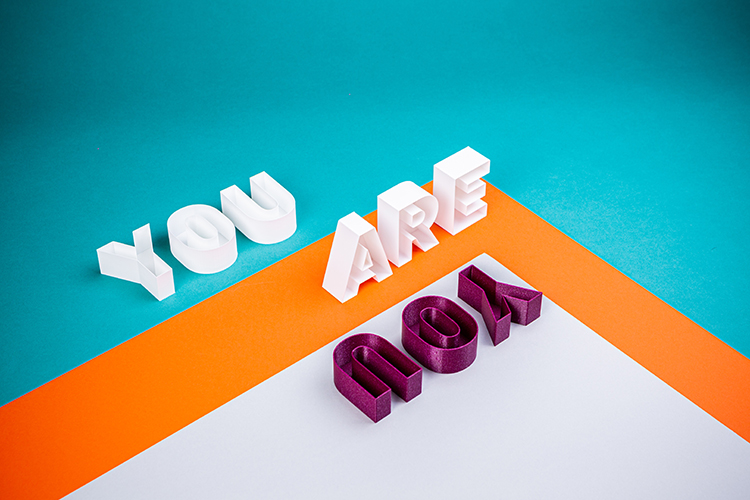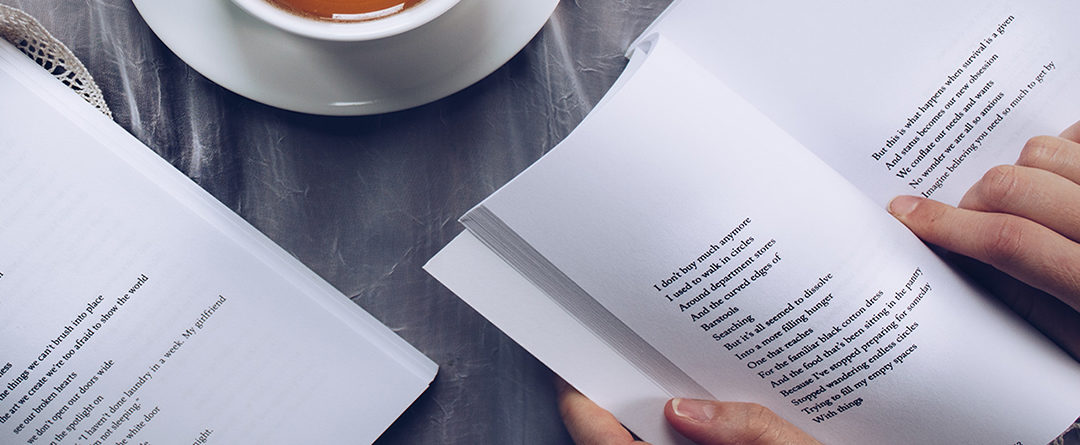by Sarah Carson
Lately, I’ve been obsessed with the first few lines of Mary Oliver’s famous poem “Wild Geese”:
“You do not have to be good,” the poem begins. You don’t have to walk through the desert on your knees, repenting. All you have to do, Oliver says, is “let the soft animal of your body love what it loves.”
(You can read the rest of the poem here.)
For most of my life, the thing that “the soft animal” of my body has loved is poetry.
Even as a child, I loved it unconditionally: Dr. Seuss. Shel Silverstein–whatever silly couplet was on the last page of Highlights magazine. As I got older, I’d read just about anything that even looked like a poem. I loved Shakespeare even though I could barely understand it. And if a CD’s liner notes didn’t include song lyrics, I was not a happy camper. Thank God for the internet.
I also loved writing poetry. When middle school came around and life got confusing, my notebook became my best friend. I didn’t worry about the quality of what I wrote. It was just for me. It was a way to get from one day to the next.
Then something terrible happened. In college, I got this bright idea that if I got my master’s degree in poetry, I might get a job where I could spend all day talking about poetry with students—helping them write their poems as I also wrote mine in between classes.
So I enrolled in graduate school.
In many ways, graduate school was a wonderful experience where I met other writers and read interesting books and talked about the things I cared about most in life. But it was also the first time I cared about whether or not what I wrote was any “good.” I started to worry about getting my poems published. Then when I eventually published them, I started worrying if I could do it again.
In graduate school—and after—what I read also mattered. I started filling my bookshelf with books I didn’t love because I thought I was supposed to have them.
Rather than letting “the soft animal…love what it loves,” I was walking “on my knees…through the desert,” desperate “to be good,” to be approved of by my friends, by my teachers, and by editors and readers I didn’t know and had never met.
Lions, dinosaurs and Instagram
 This trap isn’t specific to poets, of course. Many fall victim to the belief that our value is in something outside of us—a job, a relationship, a reputation.
This trap isn’t specific to poets, of course. Many fall victim to the belief that our value is in something outside of us—a job, a relationship, a reputation.
Even if we logically know we are more than what we achieve or accomplish, our actions betray how we feel. We answer one more email to make certain the boss knows how valuable we are. Or we don’t say the thing that needs to be said because we don’t want to make waves or draw attention to ourselves.
Some of this is evolutionary. Early humans had to fit in with the group lest they get left in the wilderness to be eaten by a lion. Or a dinosaur. (Ok, the timeline isn’t exact, but you get my point).
Modern culture hasn’t made this any easier. Many of us are surrounded by consumerism and marketing that plays to our insecurities. Then there’s social media, which is designed with our addiction to “likes” in mind. The problem of trying to find our value outside of ourselves is not a modern one, however.
“We do not dare to classify or compare ourselves with some of those who commend themselves,” Paul wrote to the Corinthians. “But when they measure themselves by one another and compare themselves with one another, they do not show good sense.”
Even the Corinthians needed to be reminded that it is not the opinions of other people that matter.
“’Let the one who boasts, boast in the Lord,’” Paul continues. “For it is not those who commend themselves that are approved, but those whom the Lord commends.”
Who does the Lord commend?
“Are not five sparrows sold for two pennies?” Jesus said. “Yet not one of them is forgotten in God’s sight. But even the hairs of your head are all counted. Do not be afraid; you are of more value than many sparrows” (Luke 12:6-7).
We are worthy as we are—no matter what the advertisements say.
You are not the poem.
One of the books that saved me from the people-pleasing hole I fell into was Natalie Goldberg’s Writing Down the Bones .
“It is important to remember we are not the poem,” she writes. “The power is always in the act of writing. Come back to that again and again and again. Don’t get caught in the admiration of your poems.”
For me, the power is in the act of writing. For you, it might be running, baking, or mowing the lawn.
Is there something you’re “caught in the admiration of”? Are you working a job you hate because you like the fancy title? Do you keep bringing your friends’ favorite cookies to the barbecue when you want to make a lemon tart? (You can bring me some lemon tart.)
Remember, you are not the poem or the vice president of whatever. You are you.
“You do not have to be good.”
“You” was always good enough.
Discussion questions:
1. Is there something in your life you put pressure on yourself to do “well”? What is it? Why?
2. Do you believe others are worthy of love as they are—faults and all? Do you believe that about yourself?
3. What might happen if you gave up trying to meet others’ standards and instead believed that you were already lovable as you are?
Closing Prayer:
Creator God, the Bible declares that you created the world and everything in it and “saw that it was good.” May I be reminded how that goodness also extends to me, that I am loved as I am—weaknesses and all. And not for anything I have or haven’t done. And may I extend that same kind of love, grace and empathy to all. Amen.
Sarah Carson is a former managing editor of Gather magazine. Her book How to Baptize a Child in Flint, Michigan will be published by Persea Books in Fall 2022. Read more of her work at stuffsarahwrote.com.


Thank you, Sarah, for the beautifully written reminder that we are “not the poem” – that we are good enough not because of what we produce but simply because we are. And woo who on the publication of your book! I look forward to reading it.
One more reminder that God don’t make no junk. He created all good, each of us, and we need reminders of it often. I look forward to your words in any format. Thank you.
Shirley, just seeing your name makes me smile. I hope all is well with you!
All is well with me and my family!
God bless you and your little one today and every day!
Sarah, this was just what I needed to read today! I needed to be reminded that bring me is all that matters. Thank you for sharing your wisdom.
Don’t we all, Cathy?! 🙂
I too loved your article and enjoyed reading the poem by Mary Oliver. During the height of the pandemic when we were mostly stuck in our apartments here at Westminster Place, one of our chaplains would do some readings from the chapel here, and Mary Oliver was one of the frequent contributors to the articles she read to us. She continued this practice each week after we were no longer having to stay in our apartments all the time, to my great enjoyment and that of many other residents here.
Thank you for this article, it woke me up to realize that I am ok as I am. I always knew that God loves me unconditionally but still continue to try and be someone that I think others want me to be. I need to focus on being me.
Thank you for the refreshing article about poetry and your perspective. It is so refreshing! We do put too much pressure on ourselves to perform and to produce and have the hardest time being content, to just breathe and be our own lovable selves. I would be happy to read more articles from you.